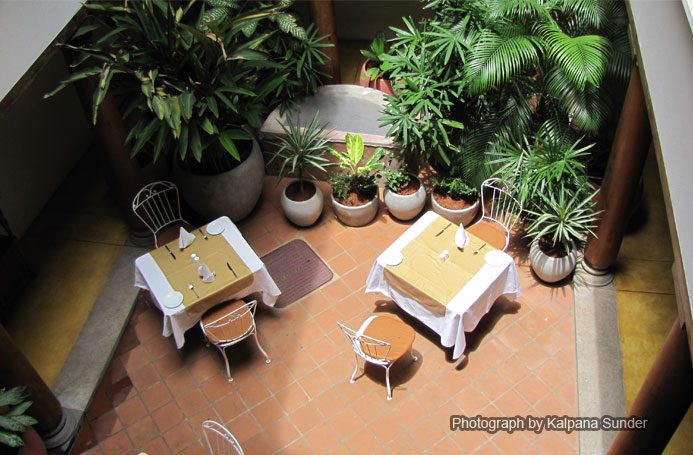
Policemen in red kepis, houses in hues of yellow and blue with shuttered windows and decorative grill; this is the Puducherry of the tourist brochures. But deeper inside in the town, away from the fashionable French Quarter, is a different world rarely explored by the average tourist: the traditional Tamil quarter. Where an entire street is homogeneous with connecting roofs and similar looking houses. This is where CGH Earth's ‘ Maison Perumal' is tucked away. It does not look like a hotel at first glance. Its entrance is unpretentious and parking is on the street. It's familiar, though, and reminds me of my grandfather's home and a million other traditional Tamil homes, now gone into oblivion.
Meticulous restoration
The traditional thinnai leads to an open courtyard filled with sunlight. This early 20th century villa, now on long lease, has just 10 rooms all done up in the CGH Earth's trademark style of no clutter. In restoring this property, the hotel chose to work with INTACH Puducherry, the organisation that has done wonders to preserve the heritage and character of the city. It took them a year and a half to meticulously restore this property to its present state. Local artisans and architects jointly contributed to this masterpiece. Dinu, the friendly manager, tells me that this building used to be the Office of the Registrar of marriages and maybe it's appropriate that today it's a terribly romantic place. There are bold colour palettes in the rooms; turquoise, hot pinks, fuchsia, and orange in the silk cushions, drapes and bedspreads. I love the stylish lamps with lace prints and small touches like the gargantuan brass keys for the doors and an antique chest for storing cushions. There are gorgeous four-poster beds in some rooms and high windows with multi-hued drapes. The antique furniture like the chair and writing table, an old cupboard with inlaid tiles and comfortable chairs are designed to please the eye; the floors are waxed red oxide and unpolished Cudappah.
Eco-friendly motif
There are some modern comforts like air conditioning and a sleek elevator, which make life easier, but otherwise the eco-friendly motif is omnipresent: bags fashioned out of old newspapers to hold jute slippers, wooden dustbins and herbal soaps in the bathrooms. Water is heated with solar water heaters, CFL bulbs are everywhere. There is no mini bar or coffee maker in the rooms but as a concession (Dinu tells me that most of their other properties don't have it) there's a small TV set. The bathrooms are comfortable, if a trifle small. The endearing details continue: small ceramic jars to store shampoo, a weathered wooden clothes hanger and a wooden palagai to hold toiletries. Fans are old-fashioned as are the lamp shades. Dotting the walls are further reminders of the past: a 1923 calendar with pictures of gods and goddesses and sepia photographs of old married couples harking back to the building's history. We understand that for 10 rooms there is staff strength of only nine people. They follow a simple practical discipline evolved by the company, where every person learns to handle every aspect of the management from cooking to housekeeping. The personal touch is evident everywhere; a heritage walk is arranged at short notice, a cup of green tea greets us after a walk and a list of local shops is supplied when I enquire about herbal products.
Come evening the building acquires a mystique. The cosy bar with muted lighting is kitschy and done up with lithographs of old Tamil movies. I sip on a delicious concoction of mango juice, mint and soda. The dining area is open looking out into the central courtyard and the slightly noisy kitchen area. Dining options are somewhat minimalistic. Good appams, stew and chicken curry, a grilled sea-food platter, rice and dal are on offer. We have a healthy, filling oriental soup and garlic bread. Food is made from whatever fresh ingredients are available. Breakfast is wholesome and delicious too. Freshly squeezed juice, freshly cut fruit like pineapple and papaya, organic preserves and melt-in-the-mouth croissants from the local bakery are designed to brighten up your mornings.
Maison Perumal is a celebration of simple joys and everyday wonders. There are a hundred places here to read a book or write poetry far away from the clamour and noise of Puducherry. You can swing on the oonjal in the reception, looking out into the open-to-sky mutram with its profusion of greenery in ceramic planters and urns with water. Or sit on an antique desk browsing the Internet (yes, they have wi-fi!). Or just gaze at the kaleidoscopic play of light on the wooden beams of the high Madras ceiling or the stained glass balconies overlooking the courtyard. If you hanker after some bright lights and retail therapy, the shopping mile of Mission Street is just a stone's throw away. In any case staying at the Maison Perumal takes you to a bygone era when life moved in the slow lane and Nature nurtured man. True to its name, (Maison means home) staying here, feels more like living in a gracious old Tamil home than in a boutique hotel.
The author is a Japanese language specialist and travel writer based in Chennai.
Quick facts How to get there: It's a three hour drive from Chennai on the ECR highway to Puducherry.
Location: Number 44 (old number 58), Perumal Koil Street, Puducherry
Accommodation: 10 standard air-conditioned rooms Tariff: Rs 6,500 per night inclusive of breakfast
Contact: Call 0413-2227519/ 9442127519 or visit www.cghearth.com
Published in THE HINDU SUNDAY MAGAZINE, 2010

